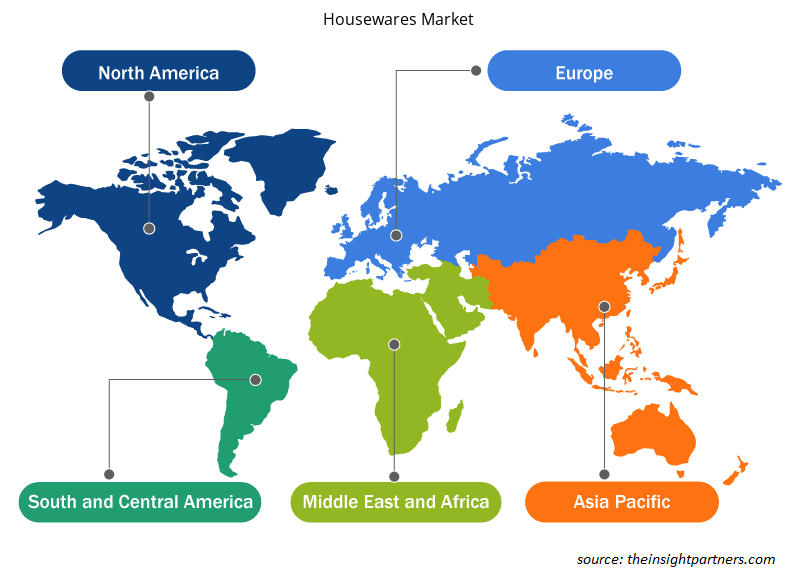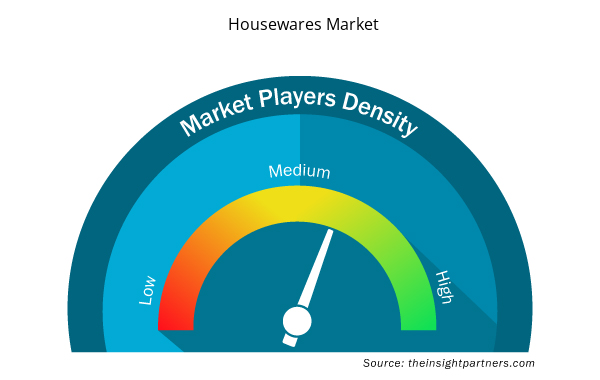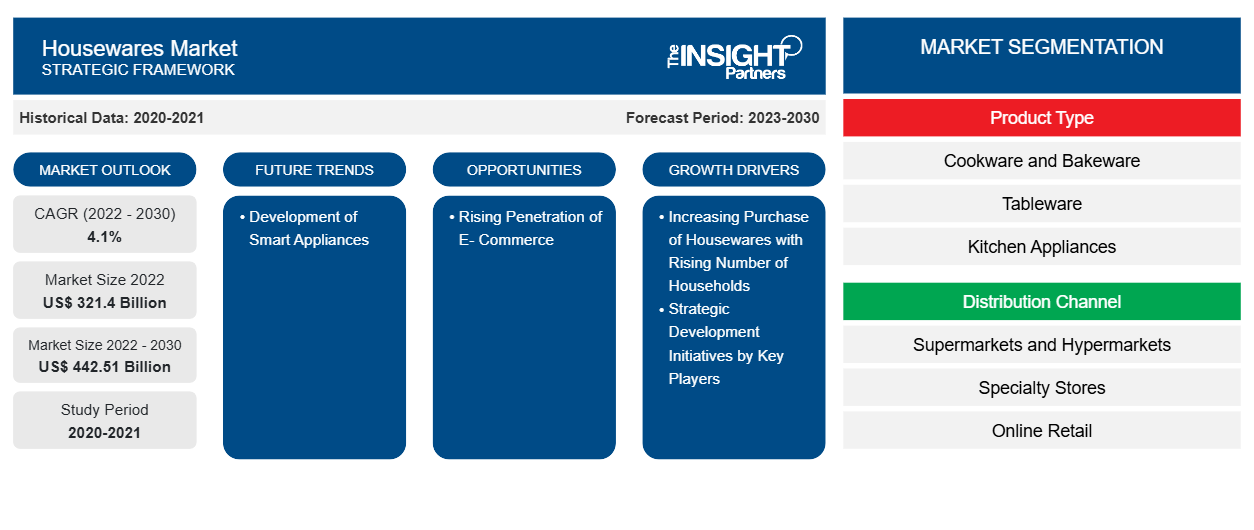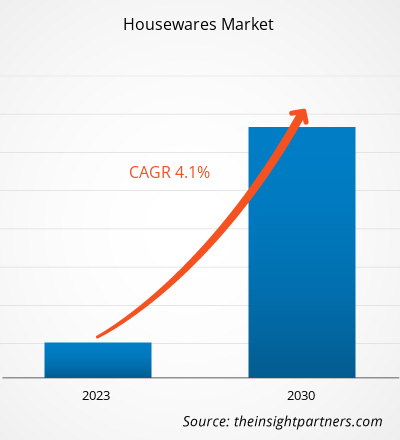[調査レポート] 家庭用品市場規模は2022年に3,214億米ドルと評価され、2030年までに4,425億1,000万米ドルに達すると予想されており、2022年から2030年にかけて4.1%のCAGRを記録すると予測されています。
市場洞察とアナリストの見解:
家庭用品とは、家庭内で調理、ベーキング、家の整理整頓などに使用される製品やアイテムです。家庭用品市場は、ライフスタイルの変化や自宅で過ごす時間の増加などの要因により着実に成長しており、機能的で見た目に美しい家庭用品の需要が高まっています。COVID-19パンデミックの間、人々は家で過ごす時間が増え、生活空間の改善に投資しました。さらに、eコマースやオンラインショッピングプラットフォームの台頭により、消費者は自宅からさまざまな家庭用品にアクセスして購入することが容易になりました。これらの要因と、家庭用品企業が提供する革新的なデザインや持続可能なオプションが相まって、家庭用品市場の拡大に有利に働いています。
成長の原動力と課題:
ライフスタイルの劇的な変化と共働き世帯の増加により、可処分所得が増加し、世帯の生活水準が向上しました。可処分所得の増加に伴い、消費者は便利な生活をサポートする家庭用品やその他の電化製品に多額のお金を費やしています。彼らは、個性に訴えるユニークなスタイルの新製品を購入する傾向があり、その結果、購入頻度が高くなります。さらに、単身世帯の急増により住宅改修の必要性が高まり、キッチン家電、調理器具、ベーキング用品、食器、バスルーム必需品などの家庭用品の需要が高まっています。
さらに、都市化の進展により、住宅ユニット、そして最終的には家庭用品の需要が高まっています。米国国勢調査局と米国住宅都市開発省によると、米国は2021年に約130万戸の住宅の建設を完了しましたが、約170万戸の住宅の建設が進行中でした。同様に、ヨーロッパ諸国での都市化の進展により、住宅に対する大きな需要が生まれています。欧州委員会によると、欧州連合では2015年から2021年にかけて住宅建築許可が42.3%増加しました。2021年には、フランス、ドイツ、ポーランドがヨーロッパで最も多くの住宅建設着工数を占めました。このように、さまざまな国で住宅ユニットの建設が増加していることで、家庭用品の需要がさらに高まっています。このように、家庭用品の購入の増加と世帯数の増加が、家庭用品市場の成長を促進しています。
しかし、家庭用品市場は、発展途上国で営業している多くの未開拓の小規模な民間企業や露天商のために、非常に細分化され、無秩序になっています。ビジネススタンダードに掲載された記事によると、2020年の時点で、インドのキッチン用品市場の80%は未組織でした。地元の中小企業は、調理器具、耐熱皿、浴室アクセサリー、食器などの家庭用品を製造するために低品質の原材料を使用しています。低品質の原材料を使用すると、損傷しやすい低品質の最終製品になります。また、メーカーはこれらの製品を低価格で提供しているため、大多数の消費者は手頃な価格と入手のしやすさからこれらの製品を購入します。この要因により、大手家庭用品メーカーの顧客基盤が縮小しています。
さらに、組織化されていない家庭用品市場では、現地メーカーが規制基準を遵守していないことが多く、品質問題を引き起こし、家庭用品に対する消費者の認識を阻害する可能性があります。さらに、偽造品の流通により、主要企業のブランドイメージが損なわれる可能性があります。このように、運営と規制の統一性の欠如が家庭用品市場の成長を妨げています。
要件に合わせてレポートをカスタマイズする
このレポートの一部、国レベルの分析、Excelデータパックなど、あらゆるレポートを無料でカスタマイズできます。また、スタートアップや大学向けのお得なオファーや割引もご利用いただけます。
- このレポートの主要な市場動向を入手してください。この無料サンプルには、市場動向から見積もりや予測に至るまでのデータ分析が含まれます。
レポートのセグメンテーションと範囲:
世界の家庭用品市場は、製品タイプ、流通チャネル、および地域に基づいてセグメント化されています。製品タイプに基づいて、市場は調理器具とベーキング用品、食器、キッチン家電、バスルーム必需品、その他に分類されます。流通チャネル別では、市場はスーパーマーケットとハイパーマーケット、専門店、オンライン小売、その他に分類されます。地域別に見ると、世界の家庭用品市場は、北米、ヨーロッパ、アジア太平洋、中東およびアフリカ、南米および中米に大まかに分類されています。
セグメント分析:
製品タイプに基づいて、家庭用品市場は、調理器具とベーキング用品、食器、キッチン家電、バスルームの必需品、その他に分類されます。食器セグメントは、2022年から2030年の間に最高のCAGRを記録すると予想されています。食器セグメントには、食器、カトラリー、ガラス製品、サーブウェアなどの製品が含まれます。家庭用品市場における食器の需要の急増は、COVID-19パンデミック中の食習慣の変化に起因する可能性があります。自宅で食事をする人が増えるにつれて、人々は自宅での食事の体験を向上させるため、美しく機能的な食器に注目し始めました。毎日の食事から特別な集まりまで、消費者は食事の体験を高める食器セットを求めています。さらに、ユニークで職人技のデザインに対する評価が高まっていることも、食器の需要を促進する上で重要な役割を果たしています。消費者は、食事の場に個性と個性をもたらす手作りで芸術的にインスピレーションを受けた食器にますます惹かれています。このように、よりパーソナライズされ、見た目が印象的な食器の選択への移行は、食器部門の家庭用品市場の発展に貢献しています。Vivo - Villeroy & Boch Group、Corelle、Pyrex、Luminarc、Schott Zwiesel は、食器市場で活動している著名な企業の一部です。
地域分析:
家庭用品市場は、北米、ヨーロッパ、アジア太平洋、中南米、中東アフリカの5つの主要地域に分かれています。2022年の世界の家庭用品市場はアジア太平洋地域が独占し、この地域の市場規模は1,206.3億米ドルに達しました。ヨーロッパは2番目に大きな貢献者で、世界市場の23%以上のシェアを占めています。アジア太平洋地域は、2022年から2030年にかけて5%を超える大幅なCAGRを記録すると予想されています。都市化の進展と中流階級の可処分所得の増加は、先進的なキッチン家電やスタイリッシュな食器など、モダンで便利な家庭用品の需要を押し上げる主な要因です。
家庭用品市場の地域別分析
予測期間を通じて家庭用品市場に影響を与える地域的な傾向と要因は、Insight Partners のアナリストによって徹底的に説明されています。このセクションでは、北米、ヨーロッパ、アジア太平洋、中東、アフリカ、南米、中米にわたる家庭用品市場のセグメントと地理についても説明します。

- 家庭用品市場の地域別データを入手
家庭用品市場レポートの範囲
| レポート属性 | 詳細 |
|---|---|
| 2022年の市場規模 | 3,214億米ドル |
| 2030年までの市場規模 | 4,425.1億米ドル |
| 世界のCAGR(2022年 - 2030年) | 4.1% |
| 履歴データ | 2020-2021 |
| 予測期間 | 2023-2030 |
| 対象セグメント | 製品タイプ別
|
| 対象地域と国 | 北米
|
| 市場リーダーと主要企業プロフィール |
|
市場プレーヤーの密度:ビジネスダイナミクスへの影響を理解する
家庭用品市場は、消費者の嗜好の変化、技術の進歩、製品の利点に対する認識の高まりなどの要因により、エンドユーザーの需要が高まり、急速に成長しています。需要が高まるにつれて、企業は提供品を拡大し、消費者のニーズを満たすために革新し、新たなトレンドを活用し、市場の成長をさらに促進しています。
市場プレーヤー密度とは、特定の市場または業界内で活動している企業または会社の分布を指します。これは、特定の市場スペースに、その規模または総市場価値と比較して、どれだけの競合相手 (市場プレーヤー) が存在するかを示します。
家庭用品市場で事業を展開している主要企業は次のとおりです。
- ブラッドショーホーム株式会社
- デンビー陶器株式会社
- HF クアーズ株式会社
- インターイケアホールディングBV
- ハッツラー製造株式会社
免責事項:上記の企業は、特定の順序でランク付けされていません。

- 家庭用品市場のトップキープレーヤーの概要を入手
COVID-19パンデミックの影響:
COVID-19パンデミックは当初、製造ユニットの閉鎖、労働力不足、サプライチェーンの混乱、金融不安により、世界の家庭用品市場の足を引っ張った。COVID-19の発生による経済減速により、さまざまな業界で事業が中断し、家庭用品の供給が抑制された。さらに、さまざまな店舗が閉鎖され、家庭用品の販売が制限された。しかし、2021年にはさまざまな国で以前に課された制限が解除され、ビジネスは勢いを増し始めた。さらに、さまざまな国の政府によるCOVID-19ワクチン接種キャンペーンの実施により状況が緩和され、世界中でビジネス活動が増加した。家庭用品市場を含むいくつかの市場は、ロックダウンと移動制限の緩和後に成長を報告した。
競争環境と主要企業:
Bradshaw Home Inc、Denby Pottery、HF Coors Co Inc、Inter Ikea Holding Bv、Hutzler Manufacturing Co Inc、TTK Prestige Ltd、Newell Brands Inc、BSH Hausgerate GmbH、Kohler Co、およびHaier US Appliance Solutions Incは、世界の家庭用品市場で活動している著名な企業です。
- 過去2年間の分析、基準年、CAGRによる予測(7年間)
- PEST分析とSWOT分析
- 市場規模価値/数量 - 世界、地域、国
- 業界と競争環境
- Excel データセット


- Adaptive Traffic Control System Market
- Space Situational Awareness (SSA) Market
- Greens Powder Market
- Joint Pain Injection Market
- High Speed Cable Market
- Wire Harness Market
- Battery Testing Equipment Market
- Health Economics and Outcome Research (HEOR) Services Market
- Cut Flowers Market
- Medical and Research Grade Collagen Market

Report Coverage
Revenue forecast, Company Analysis, Industry landscape, Growth factors, and Trends

Segment Covered
This text is related
to segments covered.

Regional Scope
North America, Europe, Asia Pacific, Middle East & Africa, South & Central America

Country Scope
This text is related
to country scope.
よくある質問
Based on distribution channel, the housewares market is segmented into supermarkets and hypermarkets, specialty stores, online retail, and others. Buying convenience and accessibility are the significant characteristics of supermarkets and hypermarkets. These stores are typically located in areas that are easily accessible by the masses, making it convenient for customers to check and purchase housewares alongside completing the planned shopping. Many supermarkets and hypermarkets have introduced their private label houseware brands, offering consumers superior-quality products at competitive prices. Supermarkets and hypermarkets have extended operating hours, which allows customers to shop at convenient hours. Also, these larger retail establishments often have the advantage of bulk purchasing power, which allows them to offer products at competitive prices. Moreover, supermarkets and hypermarkets tend to stock a variety of houseware in different product types, brands, and varieties, providing customers with a more elaborate range of selections. Walmart, Costco Wholesale Corporation, Tesco, Target, and Bed Bath & Beyond are some of the supermarkets and hypermarket stores offering houseware products.
The major players operating in the global housewares market are Bradshaw Home Inc, Denby Pottery, HF Coors Co Inc, Inter Ikea Holding Bv, Hutzler Manufacturing Co Inc, TTK Prestige Ltd, Newell Brands Inc, BSH Hausgerate GmbH, Kohler Co, and Haier US Appliance Solutions Inc among others.
Dynamic changes in lifestyle and the rising dual income families led to an upsurge in disposable incomes and improved living standards of households. With increasing disposable incomes, consumers spend significant amounts on housewares and other appliances supporting convenient living. They are often willing to purchase new products owing to their unique styles, which appeal to their individuality, resulting in a higher buying frequency. Moreover, a burgeoning number of single-person households triggers the need for home modifications, thereby driving the demand for housewares such as kitchen appliances, cookware, bakeware, tableware, and bathroom essentials. Further, a rise in urbanization has been bolstering the demand for residential units and, ultimately, homewares products. As per the US Census Bureau and the US Department of Housing and Urban Development, the US completed construction of ~1,337,800 housing units in 2021, whereas construction of 1,702,000 housing units was in progress. Similarly, rising urbanization in European countries has created a huge demand for residential housing. For instance, according to the European Commission, between 2015 to 2021, residential building permits increased by 42.3%. In 2021, France, Germany, and Poland had the most residential construction starts in Europe. Thus, the increasing construction of housing units across various countries further boosts the demand for housewares.
Smart appliances can be operated using smartphones or tablets connected via Bluetooth, near–field communication (NFC), or Wi-Fi. These technologies allow users to control their smart appliances via an app. Manufacturers are continuously modifying and developing smart home appliances to support easy lifestyles, which especially appeals to tech-savvy consumers. Well-known brands have been developing devices with automation and hi-tech features for smart homes. Moreover, voice assistants and artificial intelligence (AI) are bringing significant evolution into smart housewares.
Energy-saving appliances, notifications enabled on connected devices, and Wi-Fi capabilities are the key functional upgrades in smart kitchen appliances. For example, smart microwaves can seamlessly download cooking instructions, read barcodes on food products, and offer AI voice assistants to enable a completely hands-free experience. Whirlpool, in January 2022, announced that some of its smart, Wi-Fi-connected microwave would be upgraded to incorporate an air fry mode via a software update to replicate the crispy reheating specifications. Thus, the incorporation of innovative technologies into housewares is likely to bring new trends in the housewares market in the coming years.
Based on product type, the housewares market is categorized into cookware and bakeware, tableware, kitchen appliances, bathroom essentials, and others. The tableware segment is expected to register the highest CAGR during 2022–2030. The tableware segment includes products such as crockery, cutlery, glassware, and serveware. A surge in demand for tableware in the housewares market can be attributed to transformed dining habits during the COVID-19 pandemic. With more people dining at home, people have started focusing on aesthetic and functional tableware, as it enhances home dining experiences. From everyday meals to special gatherings, consumers are looking for tableware sets that elevate their dining experience. Furthermore, the growing appreciation for unique and artisanal designs plays a significant role in driving the demand for tableware. Consumers are increasingly drawn to handcrafted and artistically inspired tableware pieces that bring a touch of individuality and personality to their dining settings. Thus, a shift toward more personalized and visually striking tableware choices has contributed to the progress of the housewares market for the tableware segment. Vivo - Villeroy & Boch Group, Corelle, Pyrex, Luminarc, and Schott Zwiesel are a few of the prominent players operating in the market for tableware.
Trends and growth analysis reports related to Consumer Goods : READ MORE..
The List of Companies - Houseware Market
- Bradshaw Home Inc
- The Denby Pottery Co Ltd
- HF Coors Co Inc
- Inter Ikea Holding Bv
- Hutzler Manufacturing Co Inc
- TTK Prestige Ltd, Newell Brands Inc
- BSH Hausgerate Gmbh
- Kohler Co
- Haier US Appliance Solutions Inc.
The Insight Partners performs research in 4 major stages: Data Collection & Secondary Research, Primary Research, Data Analysis and Data Triangulation & Final Review.
- Data Collection and Secondary Research:
As a market research and consulting firm operating from a decade, we have published and advised several client across the globe. First step for any study will start with an assessment of currently available data and insights from existing reports. Further, historical and current market information is collected from Investor Presentations, Annual Reports, SEC Filings, etc., and other information related to company’s performance and market positioning are gathered from Paid Databases (Factiva, Hoovers, and Reuters) and various other publications available in public domain.
Several associations trade associates, technical forums, institutes, societies and organization are accessed to gain technical as well as market related insights through their publications such as research papers, blogs and press releases related to the studies are referred to get cues about the market. Further, white papers, journals, magazines, and other news articles published in last 3 years are scrutinized and analyzed to understand the current market trends.
- Primary Research:
The primarily interview analysis comprise of data obtained from industry participants interview and answers to survey questions gathered by in-house primary team.
For primary research, interviews are conducted with industry experts/CEOs/Marketing Managers/VPs/Subject Matter Experts from both demand and supply side to get a 360-degree view of the market. The primary team conducts several interviews based on the complexity of the markets to understand the various market trends and dynamics which makes research more credible and precise.
A typical research interview fulfils the following functions:
- Provides first-hand information on the market size, market trends, growth trends, competitive landscape, and outlook
- Validates and strengthens in-house secondary research findings
- Develops the analysis team’s expertise and market understanding
Primary research involves email interactions and telephone interviews for each market, category, segment, and sub-segment across geographies. The participants who typically take part in such a process include, but are not limited to:
- Industry participants: VPs, business development managers, market intelligence managers and national sales managers
- Outside experts: Valuation experts, research analysts and key opinion leaders specializing in the electronics and semiconductor industry.
Below is the breakup of our primary respondents by company, designation, and region:

Once we receive the confirmation from primary research sources or primary respondents, we finalize the base year market estimation and forecast the data as per the macroeconomic and microeconomic factors assessed during data collection.
- Data Analysis:
Once data is validated through both secondary as well as primary respondents, we finalize the market estimations by hypothesis formulation and factor analysis at regional and country level.
- Macro-Economic Factor Analysis:
We analyse macroeconomic indicators such the gross domestic product (GDP), increase in the demand for goods and services across industries, technological advancement, regional economic growth, governmental policies, the influence of COVID-19, PEST analysis, and other aspects. This analysis aids in setting benchmarks for various nations/regions and approximating market splits. Additionally, the general trend of the aforementioned components aid in determining the market's development possibilities.
- Country Level Data:
Various factors that are especially aligned to the country are taken into account to determine the market size for a certain area and country, including the presence of vendors, such as headquarters and offices, the country's GDP, demand patterns, and industry growth. To comprehend the market dynamics for the nation, a number of growth variables, inhibitors, application areas, and current market trends are researched. The aforementioned elements aid in determining the country's overall market's growth potential.
- Company Profile:
The “Table of Contents” is formulated by listing and analyzing more than 25 - 30 companies operating in the market ecosystem across geographies. However, we profile only 10 companies as a standard practice in our syndicate reports. These 10 companies comprise leading, emerging, and regional players. Nonetheless, our analysis is not restricted to the 10 listed companies, we also analyze other companies present in the market to develop a holistic view and understand the prevailing trends. The “Company Profiles” section in the report covers key facts, business description, products & services, financial information, SWOT analysis, and key developments. The financial information presented is extracted from the annual reports and official documents of the publicly listed companies. Upon collecting the information for the sections of respective companies, we verify them via various primary sources and then compile the data in respective company profiles. The company level information helps us in deriving the base number as well as in forecasting the market size.
- Developing Base Number:
Aggregation of sales statistics (2020-2022) and macro-economic factor, and other secondary and primary research insights are utilized to arrive at base number and related market shares for 2022. The data gaps are identified in this step and relevant market data is analyzed, collected from paid primary interviews or databases. On finalizing the base year market size, forecasts are developed on the basis of macro-economic, industry and market growth factors and company level analysis.
- Data Triangulation and Final Review:
The market findings and base year market size calculations are validated from supply as well as demand side. Demand side validations are based on macro-economic factor analysis and benchmarks for respective regions and countries. In case of supply side validations, revenues of major companies are estimated (in case not available) based on industry benchmark, approximate number of employees, product portfolio, and primary interviews revenues are gathered. Further revenue from target product/service segment is assessed to avoid overshooting of market statistics. In case of heavy deviations between supply and demand side values, all thes steps are repeated to achieve synchronization.
We follow an iterative model, wherein we share our research findings with Subject Matter Experts (SME’s) and Key Opinion Leaders (KOLs) until consensus view of the market is not formulated – this model negates any drastic deviation in the opinions of experts. Only validated and universally acceptable research findings are quoted in our reports.
We have important check points that we use to validate our research findings – which we call – data triangulation, where we validate the information, we generate from secondary sources with primary interviews and then we re-validate with our internal data bases and Subject matter experts. This comprehensive model enables us to deliver high quality, reliable data in shortest possible time.


 このレポートの無料サンプルを入手する
このレポートの無料サンプルを入手する